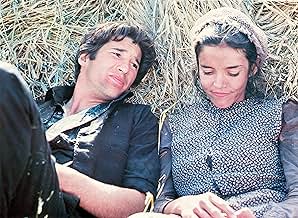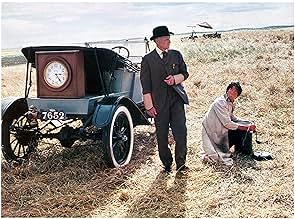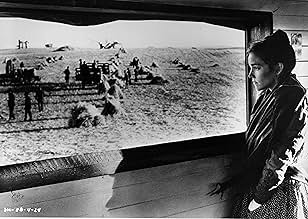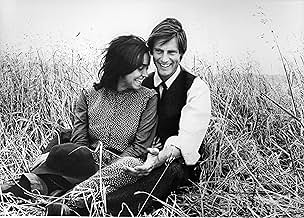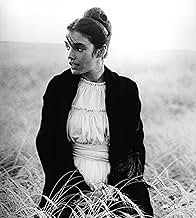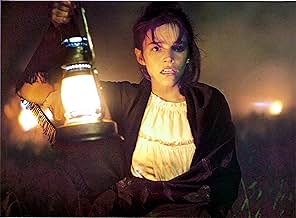A hot-tempered farm laborer convinces the woman he loves to marry their rich but dying boss so that they can have a claim to his fortune.A hot-tempered farm laborer convinces the woman he loves to marry their rich but dying boss so that they can have a claim to his fortune.A hot-tempered farm laborer convinces the woman he loves to marry their rich but dying boss so that they can have a claim to his fortune.
- Won 1 Oscar
- 13 wins & 13 nominations total
Robert J. Wilke
- The Farm Foreman
- (as Robert Wilke)
Timothy Scott
- Harvest Hand
- (as Tim Scott)
Terrence Malick
- Mill Worker
- (uncredited)
- Director
- Writer
- All cast & crew
- Production, box office & more at IMDbPro
Featured reviews
This movie was a full and happy surprise for me. This man, Malick, stood twenty years out of business because he had to be, afterwards, after such a beautiful movie he couldn't and shouldn't return with any other thing shorter than this.
Days Of Heaven is absolutely perfect cinema, the plot is not important, Malick simply wants to fill your senses and he achieves it.
I haven't had the chance to watch it in a theatre, I was four years old at the time, I've watched it on television, and I understood immediately, this man is a hero for building up such a magnificent film in the United States, in Hollywood.
A true director builds a universe of his own, with its own "time flow" and dreams and that is what Malick achieved with this film, magic, sacral art. Some sequences are "almost" (a big almost) Tarkovskyand this is a big commendation.
Days Of Heaven is absolutely perfect cinema, the plot is not important, Malick simply wants to fill your senses and he achieves it.
I haven't had the chance to watch it in a theatre, I was four years old at the time, I've watched it on television, and I understood immediately, this man is a hero for building up such a magnificent film in the United States, in Hollywood.
A true director builds a universe of his own, with its own "time flow" and dreams and that is what Malick achieved with this film, magic, sacral art. Some sequences are "almost" (a big almost) Tarkovskyand this is a big commendation.
"Days of Heaven" is a beautiful film with fantastic panoramic cinematography. It's hard to say what it is about this film that captivated me from the start. I didn't expect to enjoy it when I read about the plot. Farm workers? How could that be interesting... But oh, the haunting, heavenly silence of the fields undulating in the wind, a silence not sundered by any garish music. Everything about this film is tangible, real, alive. The dialogue is sparse, believable, the bond between Bill and Abby is one of quiet passion that needs no dramatic proclamations to fuel it. And Sam Shepard's farmer is touching. I don't use that word very often, but I'll venture it here. I have watched this film now several times, and it is a delight each time when the farmer first sees Abby. This perhaps the strongest and most believable love triangle ever put to film, and in my opinion, the most compelling.
I can understand why Malick didn't make another movie after he made Days of Heaven. The film was panned by the majority of the critics who could only find the cinematography worthy of praise. However, Malick was hugely misunderstood by these dumb critics.
They complain that the film is ponderously slow. This was the intention. Malick used pause to convey that the characters think. Too many actors rattle off their lines without letting their characters think of them. It also conveys the slow pace of their lives.
Critics complain that the characters are too remote - one feels removed from them and can't get involved. Hello! It is narrated by a 13 yr old and is essentially her view of the events that transpired. Naturally she does not grasp most of the more adult moments between them and thus is herself removed from being fully involved in Bill and Abby's relationship and that is what has to come across.
Then Malick, in a moment of genius, allied the four main characters to the four elements; Earth, Air, Fire & Water. Bill is Fire - he is seen at first in front of the furnaces of a foundry where he works. We can see his temper is volatile. Abby is water - in the very first shot she is scavenging(?) by a stream and she is seen against the backdrop of the river. Linda is Earth - In her narration she says that she is close to the "Oith". The Farmer is Air - constantly tinkering with his weather vane, and his fields of wheat are often seen waving in the wind.
All in all a severely mies-judged film and the critics owe Malick a huge apology. The work is pure genius!
They complain that the film is ponderously slow. This was the intention. Malick used pause to convey that the characters think. Too many actors rattle off their lines without letting their characters think of them. It also conveys the slow pace of their lives.
Critics complain that the characters are too remote - one feels removed from them and can't get involved. Hello! It is narrated by a 13 yr old and is essentially her view of the events that transpired. Naturally she does not grasp most of the more adult moments between them and thus is herself removed from being fully involved in Bill and Abby's relationship and that is what has to come across.
Then Malick, in a moment of genius, allied the four main characters to the four elements; Earth, Air, Fire & Water. Bill is Fire - he is seen at first in front of the furnaces of a foundry where he works. We can see his temper is volatile. Abby is water - in the very first shot she is scavenging(?) by a stream and she is seen against the backdrop of the river. Linda is Earth - In her narration she says that she is close to the "Oith". The Farmer is Air - constantly tinkering with his weather vane, and his fields of wheat are often seen waving in the wind.
All in all a severely mies-judged film and the critics owe Malick a huge apology. The work is pure genius!
This is truly a unique movie: in a class by itself. I had that opinion the first time I saw it on VHS and still feel the same way years later. It's been at the top of my list of favorite movies since I began compiling a list over a decade ago.
It's very dream-like, surreal, a film I never get tired of watching and I've watched this film more than any other in my large collection. If I had to pin it down to two reasons why, it would be the video and the audio.
The cinematography alone makes this movie worth watching repeatedly. Now that we all have access to a widescreen DVD version of this, the scenes are even more breathtaking. (I never had the pleasure of seeing this in a movie theater.)
The same superlatives can be used when discussing the soundtrack, a haunting music score that gets better and better each time one views this film. In fact, lately it's the music more than anything else I miss when I go periods without viewing this film.
The story is a simple one and is explained by others here. No need to repeat it. I find the narration to be unique, an unusual insight into the characters of the film and the thoughts of the little girl (Linda Manz), who does the narrating. The characters that continually fascinate me are Brooke Adams, as the lead female, and Robert J. Wilke, as the farm foreman. I guess it's their faces that intrigue me. Adams' down-turned mouth and sad look and Wilke's wrinklies catch my attention every time.
The story is interesting, generally low-key but with a few quick violent scenes that are quite memorable. More than that, one gets an incredible feel for the land and for the migrant workers of that time period. Another nice aspect of this film is the very small amount of profanity. Kids probably would be bored with this film but at least I wouldn't be afraid to show it to them.
But as many pluses as the story boasts, that haunting music and those incredible visuals are what drive me back for more. Great, great stuff.
It's very dream-like, surreal, a film I never get tired of watching and I've watched this film more than any other in my large collection. If I had to pin it down to two reasons why, it would be the video and the audio.
The cinematography alone makes this movie worth watching repeatedly. Now that we all have access to a widescreen DVD version of this, the scenes are even more breathtaking. (I never had the pleasure of seeing this in a movie theater.)
The same superlatives can be used when discussing the soundtrack, a haunting music score that gets better and better each time one views this film. In fact, lately it's the music more than anything else I miss when I go periods without viewing this film.
The story is a simple one and is explained by others here. No need to repeat it. I find the narration to be unique, an unusual insight into the characters of the film and the thoughts of the little girl (Linda Manz), who does the narrating. The characters that continually fascinate me are Brooke Adams, as the lead female, and Robert J. Wilke, as the farm foreman. I guess it's their faces that intrigue me. Adams' down-turned mouth and sad look and Wilke's wrinklies catch my attention every time.
The story is interesting, generally low-key but with a few quick violent scenes that are quite memorable. More than that, one gets an incredible feel for the land and for the migrant workers of that time period. Another nice aspect of this film is the very small amount of profanity. Kids probably would be bored with this film but at least I wouldn't be afraid to show it to them.
But as many pluses as the story boasts, that haunting music and those incredible visuals are what drive me back for more. Great, great stuff.
Days of heaven is exactly what this is. The magic hour (when much of the film was shot), those moments before dawn and after dusk when everything is indirect, dreamlike, breathless, heartwaking. There's no real story, as such. Sure, there's a general plot line which should satisfy any casual viewer. This isn't, after all, a hard film to follow. It is simply that the environment is the main character as opposed to the human elements. Linda Manz's young character narrates the story sporadically, like a sleepy traveler beside the campfire telling you of half-forgotten memories, and wonderful, casual observations that will seem clearer in the morning light, but no longer worth mentioning. Her voice is halting and uncertain, belying a personality that is confident in all other respects. Other actors, good (Brooke Adams, Sam Shepard) and not-so-good (Richard Gere) blend in perfectly. Their performances are so understated that you forget they are actors playing characters. Even Richard Gere, who never learned subtlety and would never again employ it, is almost invisible here.
This is not a long film. For all its leisurely pace, ninety-six minutes is all it needs to tell its tale. Terrence Malick is out for sight and sound. There is nothing lost to unneeded expression, nothing not shared in the space in front of you. That leaves cinematographer Néstor Almendros with the freedom to photograph, to observe without opinion whatever seems to be happening most openly before him.
When I first finished watching "Days of Heaven" it felt like waking from a dream. I couldn't be sure how much time has passed. It seemed so long, but the silence was the same, and little had changed outside my window. Nothing but the heavy quiet was all around me, and I felt the desperate desire to move. Everything beneath my feet felt moving, quietly slipping past and all I had to do was put soles to earth and start walking. This is a film of photographs, images of the purest sort. Open your eyes.
This is not a long film. For all its leisurely pace, ninety-six minutes is all it needs to tell its tale. Terrence Malick is out for sight and sound. There is nothing lost to unneeded expression, nothing not shared in the space in front of you. That leaves cinematographer Néstor Almendros with the freedom to photograph, to observe without opinion whatever seems to be happening most openly before him.
When I first finished watching "Days of Heaven" it felt like waking from a dream. I couldn't be sure how much time has passed. It seemed so long, but the silence was the same, and little had changed outside my window. Nothing but the heavy quiet was all around me, and I felt the desperate desire to move. Everything beneath my feet felt moving, quietly slipping past and all I had to do was put soles to earth and start walking. This is a film of photographs, images of the purest sort. Open your eyes.
Did you know
- TriviaThe shot of locusts ascending to the sky was shot in reverse with the helicopter crew throwing peanut shells down, and actors walking backwards.
- GoofsTowards the end of the movie, Bill fires three shots from a double-barreled shotgun without reloading.
- SoundtracksEnderlin
Written and Performed by Leo Kottke
Used by permission of Overdrive Music A.S.C.A.P. Copyright 1978
- How long is Days of Heaven?Powered by Alexa
Details
- Release date
- Country of origin
- Languages
- Also known as
- Días de gloria
- Filming locations
- Lethbridge, Alberta, Canada(Lethbridge Viaduct High Level Railroad Bridge)
- Production company
- See more company credits at IMDbPro
Box office
- Budget
- $3,000,000 (estimated)
- Gross US & Canada
- $3,446,749
- Gross worldwide
- $3,492,909
- Runtime1 hour 34 minutes
- Color
- Aspect ratio
- 1.85 : 1
Contribute to this page
Suggest an edit or add missing content





